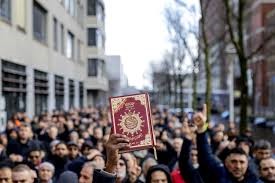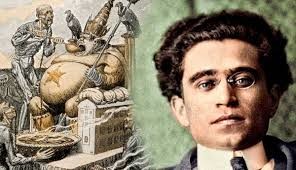
- Neoliberalism and Liberal Democracy Post-WWII: The end of WWII saw the rise of neoliberalism and liberal democracy, aiming to build a peaceful global order.
- Gramsci’s Theory: Antonio Gramsci’s concepts of “war of movement” and “war of position” explain different strategies for revolutionary change, focusing on cultural and ideological struggles in advanced capitalist societies.
- Cultural and Civilizational Disconnect: Modern Western societies face a “cut flower culture,” where the erosion of Judeo-Christian roots has led to a loss of moral and cultural vitality.
- Impact of Immigration and Leftist Policies: Unrestricted immigration and the influence of leftist ideologies in academia have led to societal unrest and challenges in assimilation, particularly in Western Europe.
What is now happening in the United Kingdom, France, Germany, and practically all the Western European countries, including India, a rising power, is the realization and implementation of Antonio Gramsci’s “war of movement” and “war of maneuver” theory. The end of the Second World War saw the rise of neoliberalism, and liberal democracy around the globe was considered an essential process for building a peaceful global order.
The transformation from the war of maneuver to the war of movement, however, started after the massive retaliation by Israel against Hamas, after the Islamic terror group from Gaza carried out one of the most well-planned terror attacks that led to the death of over one thousand three hundred Israelis/Jews. Suddenly, all over the West, there were protests against Israel’s action in Gaza led by left-liberal students/academia/liberal media and Muslims, which brought many universities in the US to their knees.
The Concept of “Cut Flower Culture” and Its Implications
But what led to this civilizational disconnect is what Will Herberg described as the “cut flower culture,” where there is spiritual rootlessness that has engulfed modern European and American societies, including now in India. What Herberg surmised was that these Western societies could not long survive without being regrafted onto their Judeo-Christian roots, which gradually waned after the end of WWII.
Ironically, Herberg, who was a committed communist who later became a Jewish theologian and a leading conservative thinker, arrived at the discernible conclusion that the attempt made by secularist thinkers to disengage the moral principles of Western civilization from their scripturally-based religious context, in the assurance that they could live a life of their own as “humanistic” ethics, has resulted in our “cut flower culture.” “Cut flowers retain their original beauty and fragrance, but only so long as they retain the vitality that they have drawn from their now-severed roots; after that is exhausted, they wither and die. So freedom, brotherhood, justice, and personal dignity — the values that form the moral foundation of our civilization. Without the life-giving power of the faith out of which they have sprung, they possess neither meaning nor vitality.”
In India, we are now seeing a generation of people, particularly Hindus, who have moved away from their roots, leading to civilizational disconnect and entropy. However, in the West, the situation is systemic in all walks of life, from societal to political, and includes the weaponization of academia infused with leftist ideology that has intellectualized violence in the name of liberalism and Islamic victimhood.
But the liberal cabal has now pushed the West to the brink, as its long-held belief that government must delegate substantial decision-making authority into the hands of international institutions and allow refugees and immigrants to move easily across borders. A case in point is Europe and the United States and how they have been flooded by millions of ‘men’ who are of military age.
That is why we are now witnessing riots all across Europe, because after the left-liberals took over the educational institutions, they fulfilled Antonio Gramsci’s concepts of the “war of movement” and the “war of position” in his writings. These terms are part of his broader theory of cultural hegemony and revolutionary strategy, and they relate to different tactics used in the power struggle.
War of Movement
– Definition: The “war of movement” (also known as “war of maneuver”) refers to a rapid, direct, and often forceful approach to overthrowing a regime. This concept is akin to a frontal assault on the state, aiming for a swift and decisive victory.
– Context: Gramsci saw this as characteristic of the Russian Revolution of 1917, where the Bolsheviks were able to seize power through a relatively quick and direct confrontation with the existing power structures.
– Characteristics: It involves open, direct confrontation and is more feasible in situations where the state apparatus is weak or during times of crisis when rapid changes are possible.
However, this tactic did not work in Western Europe and America, which were industrialized, which in itself is a question of Karl Marx’s communist theory wherein he felt that a revolution is needed in the industrial West. Still, the first successful communist regime came to power in Russia, which was predominantly an agrarian society, and later the revolution was successful in China.
Also, the West was more politically stable, and Western countries, particularly after World War II, experienced significant economic growth and prosperity under capitalist systems. However, the most important factor was that Western democracies provided mechanisms for political change and social reform through electoral processes, reducing the appeal of revolutionary change.
Political systems in the West generally protected individual rights and allowed for political dissent and organization within a legal framework, reducing the need for radical political upheaval. Also, Western societies, for a long time, had strong cultural and religious traditions that emphasized individualism and personal freedom, which throttled the ideology of communism. But with the left infiltrating academia, this last citadel is on the cusp of falling. However, once the mission is accomplished, they will eventually turn on each other, and this is a fact known to both.
War of Position
– Definition: The “war of position” is a more prolonged and strategic approach that involves gradually building up the power and influence needed to challenge and eventually change the existing order. It focuses on gaining cultural and ideological hegemony rather than immediate political power.
– Context: Gramsci argued that in more developed Western societies, where the state and civil institutions are more entrenched and stable, a direct assault is less feasible. Instead, a prolonged struggle to change cultural and social norms is necessary.
– Characteristics: This involves building alliances, influencing cultural institutions, and creating a broad consensus for change. It requires a long-term effort to shift public opinion and undermine the ideological dominance of the ruling class.
The Weaponization of Academia and Leftist Ideology
The tactic of war of position or maneuver has, in many ways, effectively sealed the fate of modern Western civilization because, for decades, the left, in the name of re-examining and reforming aspects of both to promote greater equality, inclusion, and justice, has undermined the importance of marriage and family. This structural breakdown is what many men, particularly from the Pakistani Muslim community in the UK, were able to take advantage of and sexually groom young white girls.

For decades, leftist thinkers and feminists have advocated that traditional family structures can perpetuate patriarchal norms and rigid gender roles. Leftist feminists have argued that traditional family roles often reinforce women’s subordination and limit their opportunities outside the home. This has led to a breakdown in Western society, and that is having a direct effect on their birthrate.
Application in Gramsci’s Theory

Gramsci believed that in modern capitalist societies, the ruling class maintains power not only through political and economic means but also by controlling cultural and ideological norms. To challenge this, he argued that the working class and its allies must engage in a “war of position” to gradually build a counter-hegemony.
This approach emphasizes the importance of intellectual and cultural work, including the role of education, media, and intellectuals in changing societal values and beliefs. By winning over key institutions and gaining widespread support, revolutionary forces can create the conditions necessary for a more confrontation with the state.
In summary, Gramsci’s concepts of the “war of movement” and “war of position” reflect different strategies for revolutionary change, each suited to different political and social contexts. The “war of position” is particularly relevant for advanced capitalist societies, where cultural and ideological struggles play a crucial role in challenging the status quo.
But as Europe burns, and students in the US take over the university in support of Hamas, they forget one thing: left-liberal socialists and communists do not believe in religion, but Muslims do. If one were to look into history when the Bolsheviks under Lenin grabbed power in Russia, many promises were made to the people, particularly the Muslims under Czar Rule, that they would enjoy autonomy.
Left and Islam: An Inconvenient Truth

But the right to self-determination for all ethnic groups within the former Russian Empire, including the Muslims, was taken away by Stalin, and several autonomous republics and regions for various ethnic groups, including Muslim-majority areas like Tatarstan, Bashkortostan, and others in Central Asia, existed in name only.
Stalin’s aggressive collectivization and industrialization campaigns in the 1930s disrupted traditional rural life, including in Muslim-majority regions, leading to significant hardship and resistance. As the Soviet Union was atheist, many mosques were closed, and religious leaders were persecuted. During the Great Purge of the late 1930s, Stalin targeted perceived political opponents, including ethnic Muslims. We can also see the same how the Chinese Communist Party is treating the Uyghur Muslims in the Xinjiang province and how since around 2017, the Chinese government has detained over a million Uyghurs and other Muslim minorities in what it calls “re-education” camps.
Epilogue
“Is Paris burning?” was the question Hitler asked Alfred Jodl, his Chief of Staff, on August 25, 1944, hours before Paris was liberated from Nazi rule. However, Paris and other parts of France, the UK, and other European countries are burning. The unrestricted illegal immigration of men who are mostly from Muslim countries has led to a rise in violent crimes like rape, murder, or both all across Western Europe by ultra-left liberal governments.
Samuel Huntington, the author of the book ‘The Clash of Civilizations’ said it best: “But then I concluded that no, while there may be an immigration problem, it isn’t a serious problem. The really serious problem is assimilation.” Francis Fukuyama, in a very influential essay, wrote, “The great ideological battles between east and west were over, and that western liberal democracy had triumphed,” but in all estimation, the battle to safeguard Western liberal pluralistic democracy has just started.
(The author is a freelance writer and has published articles on defence and strategic affairs and book reviews. He tweets @LaxmanShriram78. The opinion expressed is the author’s own)
Balaji is a freelance writer with an MA in History and Political science and has published articles on defence and strategic affairs and book reviews. He tweets @LaxmanShriram78. Views expressed are the author’s own.
